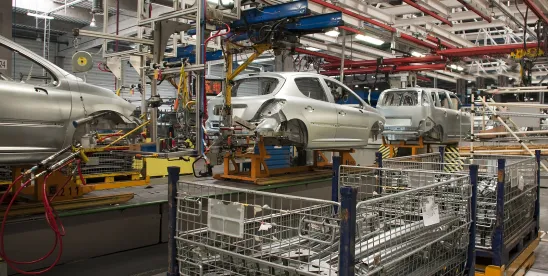Key Developments
- Foley & Lardner will be among the speakers at the MEMA OE Digital Transformation in Mobility event beginning at 8:30 a.m. (ET) at the MEMA Conference Center in Southfield, Michigan on July 29, 2025. Registration information can be found HERE.
- Foley & Lardner will be among the speakers at the Advanced Technology Council (ATC) meeting beginning at 12 p.m. (ET) at the MEMA Conference Center in Southfield, Michigan on July 29, 2025. If you are interested in attending, please contact Lauren Sobecki at lsobecki@mema.org.
- A July 7 executive order extended a pause for the reimposition of the Trump administration’s “reciprocal” tariffs to August 1, from a previous deadline of July 9. The tariff rates that could begin on August 1 will range from 25% to 40% for over a dozen nations that include Japan (25%) and South Korea (25%).
- President Trump on July 8 stated he intends to impose 50% tariffs on copper imports, without providing details on how and when the new levies may be implemented.
- The One Big Beautiful Bill Act signed by President Trump on July 4 terminates tax credits for qualifying new (30D), used (25E), and commercial (45W) electric vehicles after September 30, 2025. The alternative fuel vehicle refueling property credit (30C) terminates after June 30, 2026. The act also establishes a phaseout schedule and restrictions related to foreign entities for the advanced manufacturing production credit (45X), eliminates fines for automakers that fail to meet corporate average fuel economy (CAFE) standards, and provides a deduction through 2028 for qualified passenger vehicle loan interest.
- Foley & Lardner partner Alejandro Gómez-Strozzi shared insights on foreign direct investment into Mexico’s automotive parts sector in the El Economista article, “Efecto Trump pega más a IED en autopartes que en autos y camiones.”
- First-half 2025 U.S. new light-vehicle sales increased 0.4% year-over-year to 7.7 million units, according to estimates from J.D. Power featured in WardsAuto.
- Second-quarter 2025 U.S. vehicle sales were up 14.2% year-over-year for Ford, 10% for Hyundai Motor America, 8.7% for Honda, 7.2% for Toyota, and 7% for GM. Sales declined 29% YOY for Volkswagen, 10% for Stellantis, 9% for Subaru, and 6.5% for Nissan.
- U.S. new light-vehicle sales in June reached a SAAR of 15.3 million units. This represents a 2.4% increase compared to June 2024, which was impacted by a dealership software outage.
- An appeal filed by an automotive supplier in a dispute with Stellantis could lead the Michigan Supreme Court to rule on the legitimacy of certain aspects of the automaker’s contracts, according to an update from Crain’s Detroit.
OEMs/Suppliers
- With the exception of Subaru, many Japanese automakers have thus far avoided significant vehicle price increases in response to U.S. import tariffs.
- Ford is on track to lead the industry in the number of recall campaigns for four out of the five past years.
- Stellantis may resort to closing certain plants over the risk of European Union fines for failure to meet CO2 emissions targets in the bloc.
- A federal appeals court decertified a class action seeking to hold GM liable for knowingly selling approximately 800,000 light vehicles with faulty transmissions in the 2015 through 2019 model years.
- A number of major Chinese automakers can develop new models or revise vehicle designs in less than half the time required by many legacy automakers, according to commentary in Reuters.
- Unnamed sources in Reuters indicated Nissan asked certain suppliers in the U.K. and the European Union to accept delays in payment.
Market Trends and Regulatory
- The National Highway Traffic Safety Administration (NHTSA) opened an investigation into nearly 1.2 million Ram pickup trucks from the 2013 through 2018 model years following reports of injuries attributed to an issue with the brake transmission shift interlock.
- Analysis from Edmunds found a record-high 19.3% of car buyers committed to a monthly car payment of $1,000 or more in the second quarter of 2025.
- U.S. House Reps. Haley Stevens, D-M.I., and Jim Clyburn, D-S.C., intend to propose legislation in the coming days that would allocate more than $10 billion for domestic critical material projects.
Autonomous Technologies and Vehicle Software
- Automotive News provided an update on how certain automakers, suppliers and dealerships are deploying artificial intelligence technologies.
- GM is testing a limited number of Bolt vehicles equipped with a Level 3 automated driving system and a safety driver on select roads in parts of Michigan and Texas, as well as San Francisco. The Society of Automotive Engineers (SAE) defines Level 3 as autonomous technology that can drive the vehicle under limited conditions without human supervision.
Electric Vehicles and Low-Emissions Technology
- On July 8 Ford stated its $3 billion EV battery plant under construction in Marshall, Michigan, is “on track to qualify for the production tax credit” under the terms in the One Big Beautiful Bill Act.
- Toyota delayed plans to begin production of a new electric SUV at its Georgetown, Kentucky plant by one year to 2028. The automaker will instead prioritize the production of the gas-powered Grand Highlander SUV.
- Nissan delayed production of two U.S.-made EV models due to challenges that include the upcoming termination of consumer EV tax credits.
- Automotive News provided an update on the status of EV assembly plant projects that have been announced in North America.
- The Canadian Vehicle Manufacturers’ Association is “cautiously optimistic” after meeting with Prime Minister Mark Carney to urge the repeal of zero-emission vehicle sales targets.
- Consultancy AlixPartners predicted that just 15 of the 129 brands producing electric and hybrid vehicles in China will be financially viable by 2030.
- China’s BYD suspended plans to build an EV plant in Mexico amid uncertainty over the Trump administration’s trade policies. BYD began electric and hybrid vehicle production this month at the site of a former Ford plant in Brazil.






 />i
/>i

